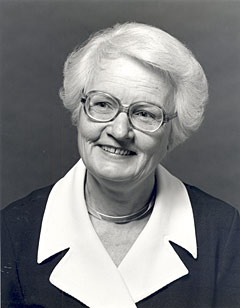Betty Connors, longtime director of Cal Performances' predecessor, dies at 92
| 15 June 2009
BERKELEY — Betty Connors, who led the Committee for Arts and Lectures (later, Cal Performances) at the University of California, Berkeley, for 35 years, died on Thursday, June 11, 2009, at her Richmond, Calif. home. Connors, who served as director of the unit responsible for performing arts presentation on the campus from 1945 to 1979, summed up her years on campus as "more interesting than any other job."
 Betty Connors (courtesy Cal Performances)
Betty Connors (courtesy Cal Performances)A native of the Midwest, Betty Connors (born May 6, 1917) attended the University of Iowa before moving to Berkeley in 1940. She married her brother's roommate, Joe Connors, who suggested Betty finish her college education at UC Berkeley. While still a student, Connors played viola in the University Orchestra, directed by Albert Elkus, and organized concerts in local venues like the YWCA and Le Bateau Ivre on Telegraph Avenue.
After Connors graduated from UC Berkeley's Department of Music in 1945, Baldwin Woods, chair of University Extension, hired her to fill a new position, "Secretary" of the Committee for Arts and Lectures (the name change to Cal Performances occurred in 1980). She took over the duties formerly administered by William Popper, a professor of Semitic languages who served as chair of the Committee on Music and Drama from 1924 to 1945.
For the first time, the university had a distinct concert-presenting unit led by a full-time administrator (the first salaried position devoted exclusively to the management of concerts on campus) rather than a member of the faculty. Connors was given free reign and, with the committee's approval, she arranged 36 music events in her first year. She worked alone, with a desk and a telephone; tickets were $1.00 with a 10-cent discount for students.
An astute manager who eagerly sought the advice and recommendations of university faculty, Connors was responsible for unprecedented growth in the quantity and range of events that took place between 1945 and 1980. The committee of faculty and university administrators with whom she worked shared Connors' conviction that "every student should have the opportunity of seeing the best that is available [in the performing arts] at some time during his or her college career."
Through the 1950s, they steadily increased the scope of arts presentation. Lectures by poets and writers, including Thomas Mann, Dylan Thomas and W. H. Auden, came to the fore, and the campus saw a broadening of musical tastes as represented by folk, jazz, and early-music events. With the increased use of Harmon Gym, and later the building of both Hertz (1958) and Zellerbach halls (1968), Connors arranged for performances by some of the world's greatest musicians, including pianists Glenn Gould and Rudolf Serkin, harpsichordists Ralph Kirkpatrick and Gustav Leonhardt, cellist Mstislav Rostropovich, soprano Birgit Nilsson, mezzo-soprano Marilyn Horne, jazz artists Dave Brubeck and Louis Armstrong, and sitarist Ravi Shankar.
The campus celebrated a major renovation of the Greek Theatre in 1957 with a production of Puccini's Turandot by the San Francisco Opera. With the success of that event, Connors seized the opportunity to present the San Francisco Opera at the Greek Theatre annually for the next 12 years. With Hertz and Zellerbach halls at her disposal, she was able to expand performing arts presentation in general, bringing to the campus French mime Marcel Marceau, theater artists Jean-Louis Barrault and Madeleine Renaud, Jerzy Grotowski's Polish Theatre Lab and Peter Brook's The Ik; and she pioneered the presentation of dance on campus with Maurice Béjart's Ballet of the 20th Century, the Joffrey Ballet, Dance Theatre of Harlem, Alvin Ailey American Dance Theater, and Merce Cunningham Dance Company, among many others.
Connors' work in arts presentation extended well beyond the Berkeley campus, and she initiated a number of regional and national strategies that greatly advanced the field. In 1958, Connors joined the fledgling Association of College and University Concert Managers (which evolved into the Association of Performing Arts Presenters in 1988, the national service organization for the performing arts), from which she received the Fan Taylor Award in 1979 for her "outstanding career and exemplary service in the field of arts administration." She was also an influential member of the International Society for the Performing Arts.
In 1967, Connors and Jerry Willis, director of the presenting program at Cal Tech, engineered the formation of the Western Arts Alliance (WAA). Together, they convened the seminal meeting with concert managers at universities west of the Rockies. Established first as the Alliance of Western Colleges for Cultural Presentations, the WAA sought to overcome the difficulty of arranging artists' tours in the western states, and in doing so created a service organization that today boasts more than 550 members and provides professional development for artists, managers and performing arts presenters. In recognition of her service to the performing arts, in 1992 Western Arts Alliance created the Betty Connors Award, an honor bestowed annually on an individual who has made superior contributions to the field. Connors was the first recipient.
When Connors retired in December 1979, after 35 years of service, the Committee for Arts & Lectures was approaching its 75th year of outstanding performing arts presentation. Betty Connors received the Berkeley Citation in November 1979, given in recognition to those "whose attainments significantly exceed the standards of excellence in their fields and whose contributions to UC Berkeley are manifestly above and beyond the call of duty."
A memorial for Betty Connors will be announced at a later date. Contributions in her memory may be made to Cal Performances at the University of California, Berkeley.

